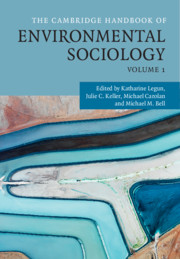Book contents
- The Cambridge Handbook of Environmental Sociology Volume 1
- The Cambridge Handbook of Environmental Sociology
- Copyright page
- Contents
- Figures
- Tables
- Contributors
- Foreword
- Introduction
- Part I Theory in Environmental Sociology
- Part II The Economy and Environmental Sociology
- 6 Material Worlds: Understanding the Relationship of Capital and Ecology
- 7 Green Economies and Community Wellbeing
- 8 Beyond the Limits to Growth: Neoliberal Natures and the Green Economy
- 9 The Ecosocialist Alternative
- 10 Commons, Power, and (Counter)Hegemony
- 11 Emplacing Sustainability in a Post-Capitalist World
- Part III Culture and Environmental Sociology
- Part IV Politics, Power, State
- Part V Social Justice
- Index
- References
11 - Emplacing Sustainability in a Post-Capitalist World
from Part II - The Economy and Environmental Sociology
Published online by Cambridge University Press: 05 November 2020
- The Cambridge Handbook of Environmental Sociology Volume 1
- The Cambridge Handbook of Environmental Sociology
- Copyright page
- Contents
- Figures
- Tables
- Contributors
- Foreword
- Introduction
- Part I Theory in Environmental Sociology
- Part II The Economy and Environmental Sociology
- 6 Material Worlds: Understanding the Relationship of Capital and Ecology
- 7 Green Economies and Community Wellbeing
- 8 Beyond the Limits to Growth: Neoliberal Natures and the Green Economy
- 9 The Ecosocialist Alternative
- 10 Commons, Power, and (Counter)Hegemony
- 11 Emplacing Sustainability in a Post-Capitalist World
- Part III Culture and Environmental Sociology
- Part IV Politics, Power, State
- Part V Social Justice
- Index
- References
Summary
The concept of a post-capitalist world implies a world after capitalism, but does not suggest a structure for economic negotiations. Rather than waiting for the fall of capitalism, community economies, as theorized by J.K. Gibson-Graham, suggests that economic exchange encompasses a wide array of activities, places, and engagements, and identifies capitalism as only one of many forms of economy. Following that logic, this chapter is based on a particular understanding of post-capitalism as a series of strategies for socio-economic-ecological negotiations. These strategies engage a politics of language, the subject, and collective action. I consider the question: what does sustainability look like in a post-capitalist world? In answer, I consider how these post-capitalist strategies can enhance the concept of emplaced sustainability. The emplacement framework fosters the concept of emplaced sustainability by relating existing case studies to each other in novel ways. This seemingly simple act furthers a politics of language, which supports the remaking of subjects through interdisciplinary scholarship and can also be extended to collective actions and transdiciplinary engagement.
- Type
- Chapter
- Information
- The Cambridge Handbook of Environmental Sociology , pp. 176 - 190Publisher: Cambridge University PressPrint publication year: 2020
References
- 3
- Cited by

